Puppet-master Iran puts on a horror show
Archduke Ferdinand. Pearl Harbour. 9/11. And now Israel, October 2023: a moment we’ll be telling our grandchildren about.
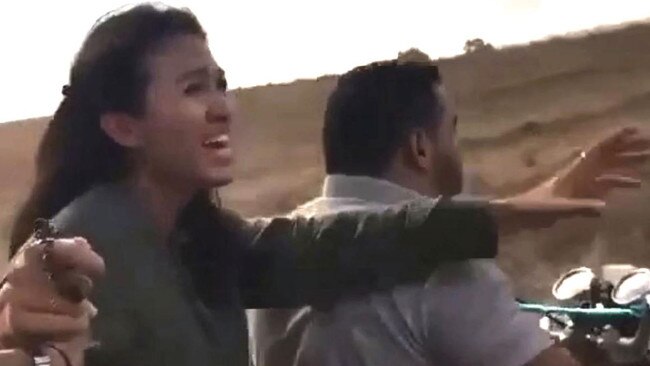
Once or twice in every generation, there is a moment destined to change everything.
It was the 1914 assassination of Archduke Franz Ferdinand that triggered World War I.
The 1941 Japanese bombing raid on a Hawaiian port that brought America into World War II.
And September 11, 2001, when al-Qaeda launched a series of co-ordinated attacks on New York City and elsewhere, killing almost 3000 people.
They are moments of shattered tranquillity – of assumptions that will never be the same.
Right now, we are witnessing another inflection point in Israel – October 7, 2023 – that will mark the beginning of a frightening new reality.
How many people died at Nova rave in Israel?
At an all-night dance party called Nova in Israel’s west, partygoers sprinted for their lives as gunfire rained down.
In a clip posted to social media, a woman who’s been identified as Israeli Noa Argamani screams in terror as she’s taken away by men with automatic weapons.
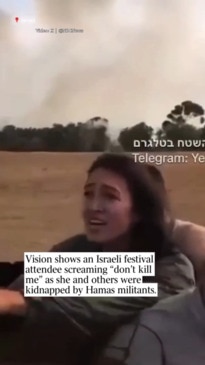
A local rescue agency says it has found more than 260 corpses at the site.
Young revellers, massacred.

Is Israel invading Gaza?
And now, Israel’s response by land and air.
Claire Harvey spoke to Cameron Stewart – The Australian’s Chief International Correspondent – about what happens next.
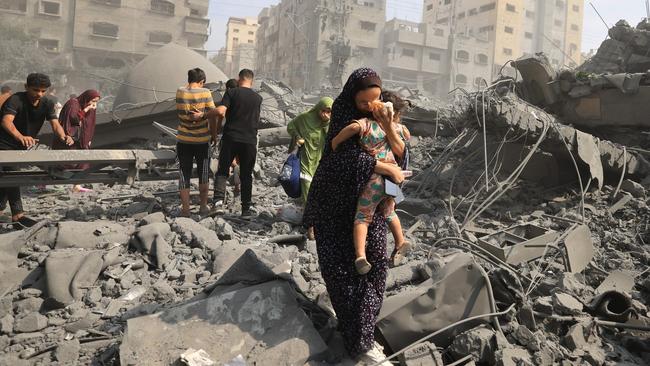
“There is a very real risk that this becomes a regional conflict,” Stewart says.
“Now that Iran has been exposed as the puppet master, the real question is whether Hezbollah coordinates and joins Hamas in attacking Israel from the north. And if that‘s the case, then that’s potentially a regional war.
“And also, how will Israel react to the news that Iran is behind this? Because that may tempt them to launch a strike against Iran because that‘s how angry they would be.”
What’s Iran’s role in Hamas attack on Israel?
It’s been reported this attack was planned in Beirut by Palestinian and Iranian personnel.
“Iran really is playing the role of a puppet master in this dispute,” Stewart says.
“Iran finances Hamas. It helps organise Hamas in Gaza. Of course, they‘re the forces that spilled over into the border and attacked Israel.
“Iran also funds and organises Hezbollah, the militant movement in southern Lebanon, which throwing rockets across Israeli borders for many years now.
“And so the great question right now is whether Hezbollah will join forces with Hamas and start attacking Israel from the north and giving Israel a two-pronged war.”

On Monday, Iran’s UN mission issued a statement denying any involvement in Saturday’s brutal attack on Israel.
“We emphatically stand in unflinching support of Palestine; however, we are not involved in Palestine‘s response, as it is taken solely by Palestine itself,” Iran’s UN mission said.
“They [Israel] are attempting to justify their failure and attribute it to Iran’s intelligence power and operational planning.
“They find it very difficult to accept that in the intelligence community, it is being narrated that they were defeated by a Palestinian group.”

So, how are we to take Iran’s denial?
“I don‘t think you can take them very seriously at all. You really have to be very sceptical of anything Iran says in this situation,” Stewart says.
“They are the fundamental supporters, financial backers and military planners for Hamas and Hezbollah. And it‘s very unlikely that that rings true.”
The question now is if Iran launches an attack of its own.
“I don’t think that’s something it would do because Iran is a nuclear power. So I think the question is more the reverse: whether the Israelis would consider a strike either at Iranian nuclear facilities or a strike against Israeli leadership.
“There are reports that Israeli leadership is really interested in striking Iran in some form. But that, of course, raises a lot of dangers. And I think that would really open the way to a potential regional war, because if Israel did strike Iran in some form, then Hezbollah would absolutely turn up the volume as far as its attacks on Israel go.”
Was Iran nuclear deal a mistake?
Politicians, diplomats, and lawmakers have been trying for decades to quell the civilian bloodshed.
Almost a decade ago, former US President Barack Obama established a deal that was supposed to bring an end to Iran’s nuclear ambitions.
The deal has largely failed, but could it have prevented this attack?

“I don‘t think it would have prevented this kind of attack. Looking back with hindsight, I think … it was a far too optimistic appraisal of Iran and the Revolutionary Guard and the Ayatollah. They turned out to be far less trustworthy than that nuclear deal thought that they would be.
“[Donald] Trump scrapped it when he was president and Biden promised to reconstitute it. And it‘s been a complete failure because the Iranians have never adhered to the terms of the agreement.
“And, effectively, the agreement is now dead in the water, even I don‘t think it’s formally declared as such.”
How are Lebanon and Hezbollah involved?
Iran’s investment in Hezbollah means Lebanon has inevitably been drawn into the conflict in Israel – or perhaps that was the plan all along.
“Hezbollah really is a proxy terrorist organisation of Iran. They are controlled by Iran. They are funded by Iran,” Stewart says.
“This is the way Iran really exports terror around the world. It has proxy groups that it funds that it argues it has some sort of distance from. But no-one really falls for that.
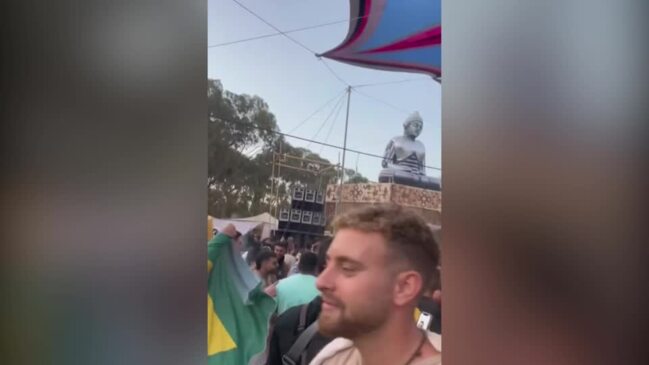
“The Iranians are definitely right behind all that Hezbollah does. And Hezbollah, like Iran, is committed to the destruction of Israel.
“Hezbollah has lots of terror activities around the world, but every couple of years, it has a fairly solid missile fight, where they throw some missiles over into Israeli territory. The Israelis fight back, but it hasn‘t got worse than that.
“And so the real question here is, given that Israel is absolutely weakened at this point in time by the attack from Gaza, does Hezbollah take advantage of this moment or does it not?”
Will Saudi Arabia’s deal with Israel go ahead?
The conflict has thrown a potential deal between Saudi Arabia and Israel in doubt, too.
“Saudi Arabia is in an interesting position because it really has been coming very close to striking a quite a stark deal with the Americans whereby it recognises Israel in return for American security guarantees, and that those talks are progressing quite a long way.
“But the trouble with that is that the Saudis are still very sympathetic to the Palestinian cause and they‘ve been asking for concessions from Israel towards the Palestinians to make the deal more palatable to the Saudis.
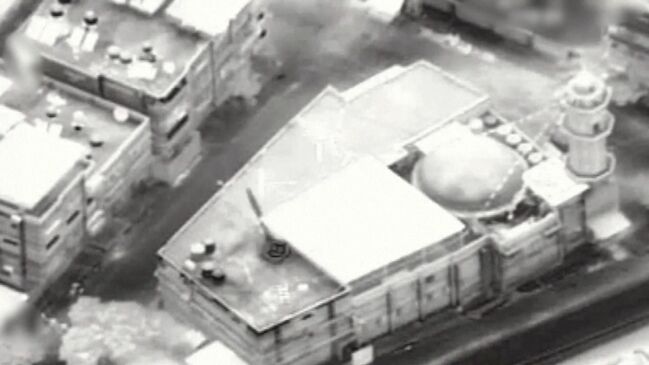
“Clearly, there is going to be a very big reprisal against Gaza, which a lot of Palestinians are going to sadly be killed or injured. And I think that really, really makes it difficult for Saudi Arabia to progress with this deal at the moment.
“And, of course, it makes it difficult for the Americans to progress with it. And if that doesn‘t come off, then that’s a big opportunity lost for a lot of countries, the Saudis to the Americans and for peace in the Middle East.”
Which countries will support Israel?
“America and all of the West, and all of Western Europe would be on Israel‘s side and the Arab nations would be on the Palestinian side. It really would be a very clean division there.
“But I don‘t think there’s any doubt that Western support for Israel is very strong in this circumstance. They clearly were the aggrieved party here.
“And I think the Israelis will go very, very hard into Gaza, and I think they will have a lot of Western support, whereas previously some Western support has been a little bit weaker for Israel, because if people have felt that the attacks on Gaza have been disproportionately large in the past.”
So, will Israel be asking nations like America and the United Kingdom to send troops into the conflict?
“I don‘t think they would do that. But I think you’d see the US and the UK give every possible support from intelligence and maybe some logistics.
“But if we saw American troops on the ground, it would just become a catastrophe as far as a regional war is concerned. I don‘t think we’re going to see that.
“The Israelis, while they have been caught in shock here by a very big intelligence failure, they are pretty powerful. They‘ve got a big army. Remember, everyone’s been trained through their national service scheme. They will be able to mobilise a lot of forces.
“I think you‘ll find that, even if Hezbollah starts to rain rockets down on Israel, that Israel will have enough troops to defend itself. It is a very heavily armed nation.”
What happens now in Israel?
The savageness of Hamas’ attack on Israel and the fearsome nature of Israel’s retaliation has many questioning if the two groups – Israel and Palestine – can continue to coexist, or if one will be wiped out all together.
“The real question here is what sort of Gaza does Israel tolerate from this point on? They don‘t ever want to have [an attack like this] happen again, obviously.
“But if Israel occupies Gaza again, which may well happen, it’s still a long-term security nightmare for Israel.
“That‘s why they got out in 2005, because of the two-million-odd people in very close quarters. It’s very, very difficult to rule that little area with a power that is unwelcomed there.
“So that‘s the great dilemma for Israel … Or do they try and reconstitute it in some other form?
“And that‘s a huge question among many for Netanyahu.”
How many casualties in Israel and Gaza?
Thousands of people from both sides – Israel and Gaza – have now been killed or injured.
Israelis – civilians including young women and reportedly also elderly people and children – have been taken hostage and transported over the border into Palestinian territory.
The horrifying question arises: for what? To be traded for Palestinian prisoners in Israeli custody? To be executed on camera, in a throwback to the rise of ISIS? To be human shields?
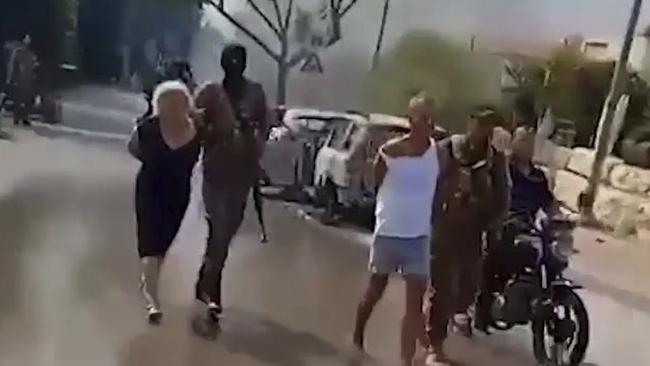
Hamas has been criticised for its tendency to set up military installation in high-density civilian areas like apartment buildings. The thinking is that Israel would be seen to be attacking civilians if it launched an attack on those bases.
But is it likely to deter Israel this time?
“It really complicates Benjamin Netanyahu‘s choices here,” Stewart says.
“I think it‘s more likely they will have some sort of ground invasion of Hamas. That’s something the Israelis have not done since they left the territory in 2005, because it would inflict a lot of casualties on Israeli soldiers as well.
“They can’t just pound Gaza into submission – obviously, for humanitarian reasons – but also because of the fact that there are Israeli hostages there as well.
“And the trouble, of course, with any attack on Gaza … it is just a really crowded, densely populated place. And any attack against Hamas inevitably involves civilians.”
What happens in Israel if Donald Trump is elected in 2024?
“Donald Trump was very vocally pro-Israel,” Stewart says.
“Of course, he moved the US recognition of the capital to Jerusalem from Tel Aviv. He got along very well with Netanyahu, much better than Biden.
“Biden has a fractious relationship with Netanyahu. He is very unhappy about the reforms to the judicial system in Israel, which have been very controversial.
“Biden feels that not much has been done as far as progressing towards a two-state solution with the Palestinians.
“And so if anything, a Trump presidency would be even more pro-Israeli than the Biden presidency.
“But we are seeing very strong support for Israel from the Biden White House at the moment. I think there is an enormous recognition that any smaller differences have to be put aside for the bigger picture.”
What does Israeli war mean for Benjamin Netanyahu?
“Netanyahu‘s position will probably be strengthened by the situation in the short-term, because everyone – even his critics – will rally around him,” Stewart says.
“But Netanyahu was very unpopular before this. The country was very divided over these judicial reforms.
“And the bottom line also is that this was a massive intelligence failure which happened on Netanyahu‘s watch.
“So, at some point in time, there will be a real reckoning about how this actually happens.
“But I think in the short term, you will see everyone rally around him with unity.”
This is an edited transcript of our daily news podcast The Front, where our journalists speak candidly about their stories.
Hear it now on Apple Podcasts, Spotify or in The Australian’s app.


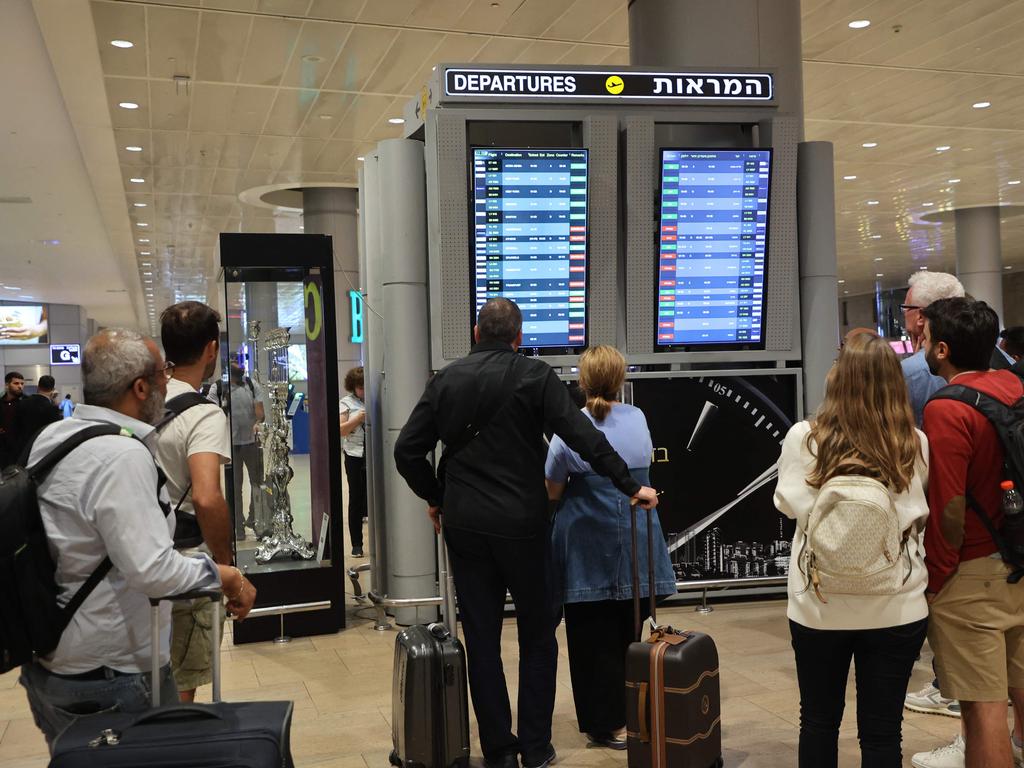


To join the conversation, please log in. Don't have an account? Register
Join the conversation, you are commenting as Logout